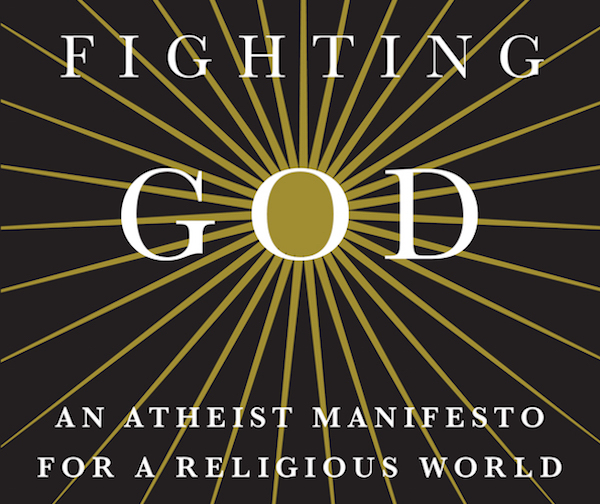Fuse Book Review: Taking God On — Atheists Should Come Out Fighting
Fighting God is logically argued, lucid, and makes a powerful case for a more secular nation.
Fighting God by David Silverman. Thomas Dunne Books, 304 pages, $26.99.

By Vince Czyz
On every coin minted and every bill printed, we see the words “In God we trust,” despite the separation of church and state upheld by Supreme Court decisions. Atheists regularly file lawsuits to have the motto removed, the most recent coming in January of this year, and regularly lose. Atheists have also filed suit to have the Pledge of Allegiance restored to its original form; the pledge was written in 1892, but the phrase “under God” was not there until it was inserted in 1954.
While these actions didn’t exactly endear atheists to believers, atheists in the United States were already a much-maligned and discriminated-against group. As unconstitutional as it may seem, particularly in a country that touts its freedoms and liberties, atheists are still banned from holding public office in seven states. Moreover, for years polls showed that an atheist president would never be elected. But that is not the story David Silverman wants to tell in Fighting God. According to Silverman, the number of atheists in the country is on the rise. “In nearly every neighborhood, every town in every state, there are atheists. We are not a small minority who can be overlooked.” The atheist population, he maintains, is larger than the number of Jews, Hindus, Buddhists, and Muslims living in America combined. And among Millennials, a generation roughly defined as being between the ages of 18 and 36, the percentage of non-believers is even higher.
Silverman, who was born into Judaism, is the president of American Atheists. He has appeared in several televised debates, including a duel of ideas with Fox TV host Bill O’Reilly and a lively, verbal slash-and-parry with Sean Hannity.
While Fighting God frequently refers to some of the biggest names among atheist authors—Sam Harris, Richard Dawkins, Christopher Hitchens—the manifesto takes a fairly unique angle: rather than trying to convince believers to correct the errors of their ways, Silverman makes an impassioned appeal to atheists who have yet to come out of the proverbial closet. Although there are sections that logically dismantle some of the claims of various religions, Silverman focuses on convincing “agnostics,” “humanists,” and “secularists” to dispense with the euphemisms and simply call themselves atheists. This issue takes on greater weight when conservative pundits and clerics throw out statistics to prove that America is a “Christian” nation; the true number of non-believers, Silverman insists, is never reflected by these surveys and headcounts. He cites statistics that show atheism spiking and non-belief on the rise, particularly among Millennials. The political front seems to have changed too. As Silverman points out, “a 2015 Gallup Poll shows 58 percent of Americans would vote for an atheist [presidential candidate] (an all-time high) … up from 45 percent in 2007.” Along with presenting a more accurate appraisal of the strength and numbers of atheists in America, Silverman also wants to take the stigma—like a stubborn stain—out of the word atheist. If theists are offended by non-belief, so what? Silverman asks. Religion, he repeatedly asserts, is not worthy of respect “simply for being.” Rather, he says, “all religions are lies, and all believers are victims.”
What I found most interesting—and alarming—is how lopsided government treatment of religious organizations, Christian outfits in particular, tends to be. This is due in large part to the Religious Freedom Restoration Act (RFRA), which was passed in 1993 and signed into law by Bill Clinton. This act, Silverman says, guarantees that “where religion clashes with secular civil law religion wins most of the time.” A Hobby Lobby–type decision, allowing a corporation to refuse to comply with federal regulations regarding health care and contraception, was inevitable. There is also the Faith-Based Initiative, which provides churches with millions of taxpayer dollars to perform various community services—offering meals or shelter to the homeless, for example—in the near-complete absence of oversight. “The churches could be keeping the money and not providing the services,” Silverman argues. “They could be providing the services poorly. They could be preaching their mythology as they provide the service (illegal, as they are using public funds to lure potential converts). We don’t know because the public doesn’t get to know.”

Author David Silverman — A belligerent atheist. Photo: Thomas Dunne Books.
The most insidious example of religious privilege, however, is built into the tax code, which “lists ‘advancement of religion’ as an official charitable activity.” Citing figures calculated by Professor Ryan Cragun, Silverman estimates that “religion gets bailed out … to the tune of $71 billion per year on property taxes alone.” To put this in perspective, he tosses out the following equivalents: “That’s enough for 28 missions to Mars per year, or 1.5 million teachers or 1.4 million police officers per year.”
No doubt about it; Silverman is an angry atheist. He writes in colloquial voice, with no aversion to pronouncing something “total bullshit” or to the calling the Religious Right “hypocritical assholes.” This informal style, coupled with material that is often incendiary, makes the book quick—but not light—reading. Silverman states his case clearly, backs up his points with statistics and case histories, and organizes the material so that it is easy to follow. Fighting God is an important counterweight to the Fox News spin that sees any challenge to Christian hegemony as “Christian bashing” or a war on God. It is logically argued, lucid, and makes a powerful case for a more secular nation.
If there’s a fault to find with this book, it is that Silverman can be a bit reductive in his sweeping statements. He never refers to religion as anything but a scam or a lie, ignoring the fact that while religions and their attendant mythologies may not be true in a literal sense, they are, as Hitchens often pointed out, our earliest attempts at explaining the universe. As such, they offer valuable, often fascinating clues into the human psyche. Hence the many volumes of scholarly works on religion and mythology from authors such as Carl Jung, Sir James Frazer, and Joseph Campbell, not to mention legions of lesser known authors and scholars. While I wouldn’t expect Silverman to go deeply into this aspect of religion in a book such as this, a nod to the value of religion in psychological or anthropological terms seems a reasonable request.
Silverman’s end-game “is the normalcy of atheists, which includes the elimination of bigotry against us.” But he has no intention of asking nicely or of being diplomatic. Religion, he concludes, isn’t just false, it is damaging, setting back stem-cell research, women’s rights, gay rights, and perpetuating wealth inequality. He advocates being proud, loud, and provocative—firebrand atheism as he calls it—since religion will not willing give up its position of privilege and go gently into that good night. It will be interesting to see in the coming years if, as Silverman predicts, the numbers of atheists continue to increase, while believers, whom statistics locate mostly in the oldest segment of the population, become increasingly rare.
Vince Czyz is the author of The Christos Mosaic, a novel, and Adrift in a Vanishing City, a collection of short fiction. He is the recipient of the Faulkner Prize for Short Fiction and two NJ Arts Council fellowships. The 2011 Capote Fellow, his work has appeared in many publications, including New England Review, Shenandoah, AGNI, The Massachusetts Review, Georgetown Review, Quiddity, Tampa Review, Boston Review, and Louisiana Literature.
